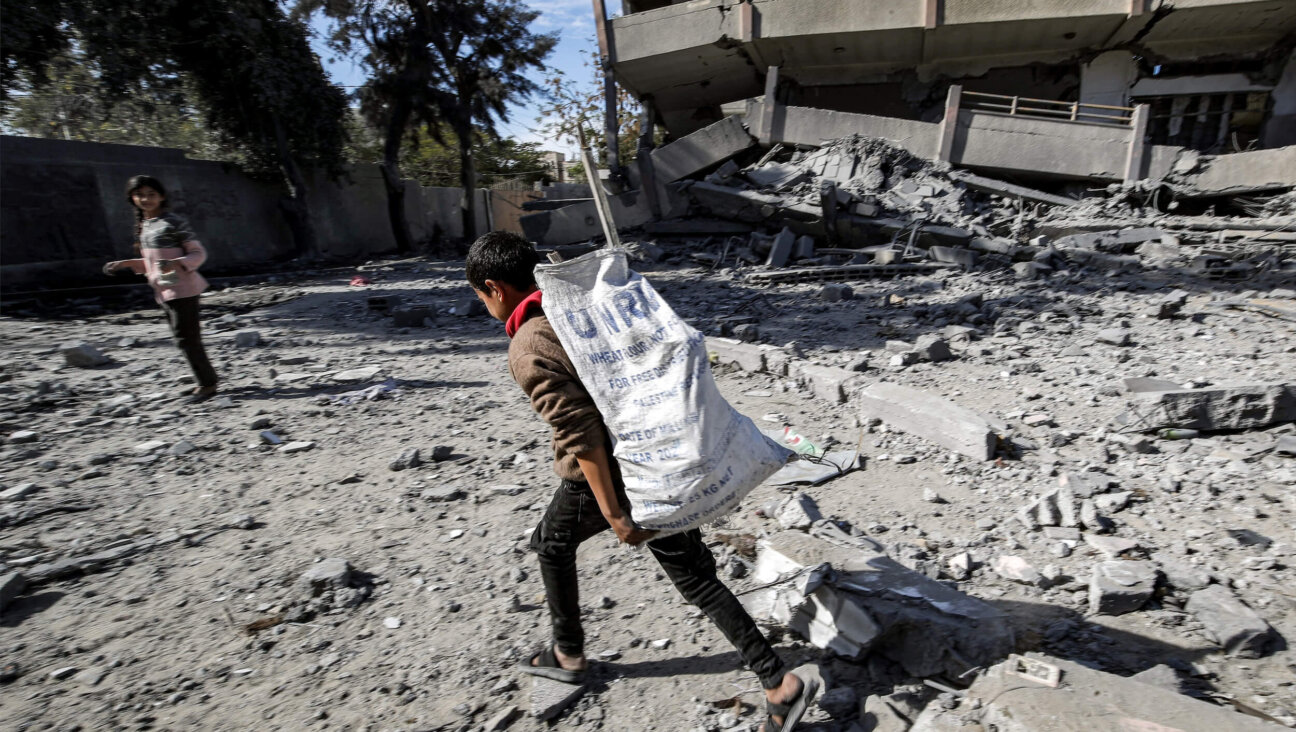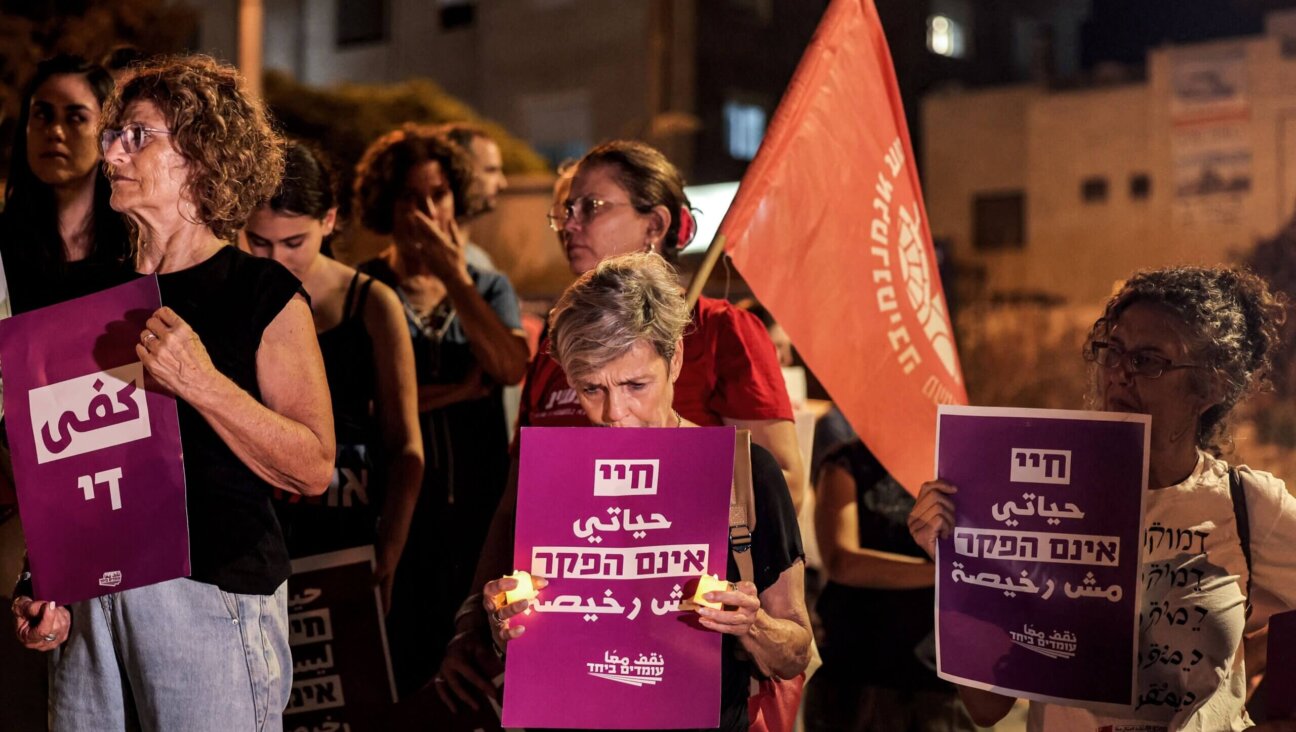Was John Kerry’s Speech a Swan Song to Israel — or a Last Gasp Peace Push?

Image by Getty Images
There are two ways to interpret the speech (text here, video here) that Secretary of State John Kerry delivered December 28 on his vision of Israeli-Palestinian peace.
One interpretation is that it was his swan song, his angry farewell to the global community and the Middle East that he tried to reshape, Through four years as U.S. secretary of state he’d spent thousands of hours trying to cajole Israeli Prime Minister Benjamin Netanyahu and Palestinian leader Mahmoud Abbas into a peace agreement. It seemed to be his No. 1 priority as secretary, and he failed. This was his opportunity to vent.
Some Israelis had claimed he had a messianic obsession. Others called him an anti-Semite bent on weakening Israel. Now his time was up, and he wanted to tell the world what he’d been trying to do, why it mattered and why it failed. He railed at length about Abbas’s waffling on terrorism and incitement of Hamas extremism, and at greater length — about three times longer — about the West Bank settlers’ one-state “agenda” that’s “defining the future of Israel.”
Finally, after explaining how extremists on both sides had foiled his quest for peace, he spent the last 15 of his 70 minutes laying out a six-point program for achieving peace. Thus, his swan song. Go figure.
That’s one interpretation of Kerry’s speech. It’s essentially the response that the speech got from most of the press and political commentariat in America and Israel alike. The exception was on the left. Israel Labor Party chief Isaac Herzog said the speech “expresses a genuine concern for Israel’s security and future.” Americans for Peace Now called it “powerful, wise and compassionate,” and urged Congress and the incoming Trump administration to “take heed” of it. Still, even the most sympathetic observers couldn’t explain how Kerry’s words might become reality. For the most part the sympathizers seemed, like the secretary himself, to be venting.
There is, however, another interpretation: that Kerry is up to something and the speech was an opening salvo. Sources in Jerusalem say Netanyahu government officials are worried about an upcoming international conference on Israeli-Palestinian peace that’s due to convene in Paris with 70 nations in attendance on January 15, at the invitation of the French government.
The fear in Netanyahu’s circles is that the Paris conference will adopt a detailed peace plan that resembles the Arab Peace Initiative (text here): two states along the 1967 borders with land swaps, both states with capitals in a shared Jerusalem and some sort of limited but still unpalatable Israeli concession on refugees. The worst-case scenario, from the point of view of Netanyahu and his allies, is that the Paris plan would then be rushed through the U.N. Security Council before noon on January 20, when the Trump administration takes office and begins to wield the veto.
If Paris does adopt a plan and it gets to the Security Council before Trump is inaugurated, it’s expected that the Obama administration would abstain to let it be adopted. It would then gain the status of international law, replacing Resolution 242 from November 1967, which called for Israeli withdrawal “from territories” captured in the Six-Day War but didn’t specify which territories or how much of them.
Israel has already begun reconsidering certain settlement decisions in light of the December 23 Security Council resolution (text here) ruling settlements to be a violation of international law. The reason: If the council calls them illegal, courts can enforce it, and Israel doesn’t want its soldiers arrested and hauled before the International Criminal Court whenever they try to visit the Louvre. A second resolution, defining the framework of peace negotiations, would make Israel’s position even more difficult by forcing it into negotiations in which the broad framework of the outcome is fixed in advance.
In this view, the December 23 Security Council vote — reaffirming the longstanding council ruling that Israel’s West Bank settlements are illegal — was the first stage in a four-part plan for changing the diplomatic and legal framework of Israeli-Palestinian relations: settlements resolution – Kerry speech – Paris conference – final framework resolution.
Kerry, in his speech, vehemently denied Netanyahu’s direct accusation that the Obama administration had colluded with the Palestinians and the Egyptians in bringing the December 23 resolution before the council. The back-and-forth over the resolution could well be a bit of shadow-boxing over the larger question of whether the current steps are part of a process meant to finish at U.N. headquarters by January 20.
If there is such a plan underway — and the French don’t deny it — then Kerry dropped an intriguing hint in that direction in his speech. As he was introducing the six-point plan toward the end, The six “principles” he was about to enumerate were meant “not to prejudge or impose an outcome, but to provide a possible basis for serious negotiations when the parties are ready. Now, individual countries may have more detailed policies on these issues – as we do, by the way – but I believe there is a broad consensus that a final status agreement that could meet the needs of both sides would do the following.” In other words, these principles I’m about to enumerate are part of a larger document we’ve got in a drawer upstairs, defining the broad terms of a negotiation, if and when it gets going.
These are Kerry’s principles:
One: “Provide for secure and recognized international borders between Israel and a viable and contiguous Palestine, negotiated based on the 1967 lines with mutually agreed equivalent swaps.”
Two: “Two states for two peoples, one Jewish and one Arab, with mutual recognition and full equal rights for all their respective citizens.” He added this: “Recognition of Israel as a Jewish state has been the U.S. position for years, and based on my conversations in these last months, I am absolutely convinced that many others are now prepared to accept it as well – provided the need for a Palestinian state is also addressed.”
Three: “Provide for a just, agreed, fair, and realistic solution to the Palestinian refugee issue, with international assistance, that includes compensation, options and assistance in finding permanent homes, acknowledgment of suffering, and other measures necessary for a comprehensive resolution consistent with two states for two peoples.”
Four: “Provide an agreed resolution for Jerusalem as the internationally recognized capital of the two states, and protect and assure freedom of access to the holy sites consistent with the established status quo.”
Five: “Satisfy Israel’s security needs and bring a full end, ultimately, to the occupation, while ensuring that Israel can defend itself effectively and that Palestine can provide security for its people in a sovereign and non-militarized state.”
Six: “End the conflict and all outstanding claims, enabling normalized relations and enhanced regional security for all as envisaged by the Arab Peace Initiative.”
It’s worth noting that while Kerry concludes by anchoring his principles in the Arab Peace Initiative, a Saudi proposal that was adopted by the Arab League in 2002 and renewed repeatedly since then — including a 2013 amendment that the 1967 borders can be amended through negotiated land swaps — Kerry’s principles actually improve on the Arab plan from Israel’s viewpoint. For one, there’s no mention of Palestinian refugees returning to their former homes in Israel. It talks about “compensation” and “finding new homes,” with the additional caveat that the solution must be “consistent with two states for two peoples” — that is, preserving Israel’s character as a Jewish state.
For another, he added a full-throated American endorsement of the Israeli position that Israel must receive recognition “as a Jewish state” — not as a detail to be considered later but as part of the basic principles underlying any negotiated agreement.
Of course, if you don’t believe Israel can give up Judea and Samaria and allow the creation of a sovereign Palestinian state next door — either because it would compromise Israel’s security, invite divine retribution or both — then all the rest is just a lot of dangerous chatter.

















